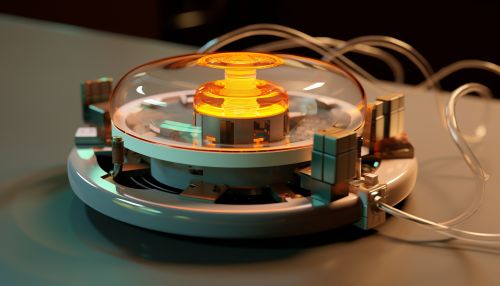Biosensor Technology
Introduction
A biosensor is an analytical device that combines a biological component with a physicochemical detector. The sensitive biological element, such as enzymes, microorganisms, organelles, cell receptors, tissues, organs, and antibodies, is a biologically derived material or biomimic component that interacts with, binds to, or recognizes the analyte under study. The biologically sensitive elements can also be created by biological engineering.


History
The idea of a biosensor was first proposed by Leland Clark in 1956. He introduced the term "enzyme electrode" as a device for measuring glucose in blood samples. This concept was later developed into the first practical biosensor in the 1960s by the same scientist.
Types of Biosensors
There are several types of biosensors, each with its unique characteristics and applications. These include:
Enzyme-based Biosensors
Enzyme-based biosensors use a specific reaction catalyzed by an enzyme, followed by detection of the products of this reaction.
Immunosensors
Immunosensors are based on the specific binding of an antigen to its antibody. The antigen-antibody interaction is then detected and measured.
DNA Biosensors
DNA biosensors are based on the hybridization of complementary DNA strands. The detection is usually achieved by labeling one of the strands with a fluorescent marker.
Cell-based Biosensors
Cell-based biosensors use whole cells as the biological component. These cells can be genetically engineered to respond to specific analytes.
Working Principle
The working principle of a biosensor involves the intimate and direct spatial contact between the biological component and the transducer. The biological component interacts with the analyte, and this interaction is converted into a measurable signal by the transducer.
Applications
Biosensors have a wide range of applications in various fields. These include:
Medical Applications
Biosensors are widely used in medical diagnostics for the detection of various diseases and health conditions. They are also used for monitoring patient's health status and response to treatment.
Environmental Monitoring
Biosensors are used in environmental monitoring for the detection of pollutants and other harmful substances in the environment.
Food and Beverage Industry
In the food and beverage industry, biosensors are used for quality control and safety testing.
Industrial Processes
Biosensors are used in various industrial processes for monitoring and control.
Future Perspectives
The future of biosensor technology looks promising with the continuous advancements in biotechnology and nanotechnology. The development of more sensitive, selective, and miniaturized biosensors is expected. The integration of biosensors with information technology is also a growing trend, leading to the development of smart biosensors and biochips.
